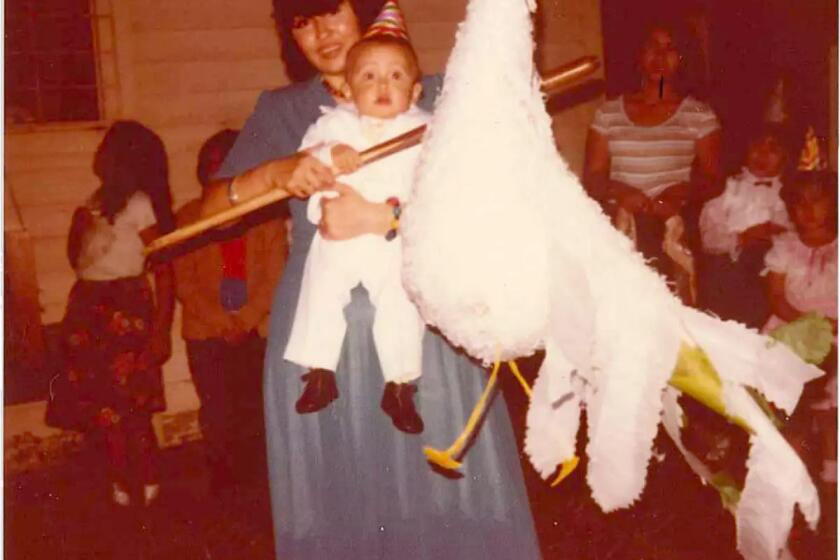Convicted Man Questions New ‘Scent Machine’
Earl Rhoney, a 20-year-old unemployed drug store clerk, says he understands the controversial science that may land him in prison for the rest of his life.
But in a jailhouse interview Friday, he said he doesn’t agree with it and will challenge his conviction because, despite a jury’s verdict Thursday, he is not the person who murdered a 46-year-old Irvine woman in her home almost three years ago.
Prosecutors’ most compelling evidence came from a “scent machine” that they said extracted Rhoney’s dead skin cells from the victim’s clothing and placed them a gauze pad for safekeeping.
Nine months later, as he walked free from Juvenile Hall after a sentence for burglary, a bloodhound named Duchess sniffed the pad and then followed Rhoney, then 17, to a nearby shopping mall, where officers swooped in to arrest him.
It was the first time evidence from such a machine was used to help convict somebody in a California court, prosecutors said.
“I understand the concept” behind the machine, Rhoney said, “but I don’t necessarily agree with it. The theory is the cells are on the pad, but it’s hard to believe they can be transferred.”
Rhoney also challenged evidence that carpet fibers from the home of the victim, Patricia Lea Pratt, were found on his clothing.
In response, prosecutors said they expect the machine’s evidence will be upheld on appeal. Deputy Dist. Atty. Debbie Lloyd, who prosecuted the case, said Friday that although evidence obtained from the machine has not been challenged in California, it has been upheld in New York, where it was first used several years ago.
What’s more, she said, she is confident that appellate judges, like the jury, would find the device is simply a more reliable alternative to the traditional way of transferring a scent: swiping a pad against a victim’s belonging.
Regarding the carpet fibers, Lloyd said that although it was never certain the fibers came from the victim’s home, “the carpet in his possession was virtually the same” as Pratt’s.
Rhoney, who appeared relaxed and composed as he talked and often used such teen lingo as “bummed” and “it sucks” to describe his mood, said he wonders if another machine might help clear his name: a lie detector test, even though the results are inadmissible in court.
“If O.J. Simpson can fail a lie detector test and still be found not guilty, then what does that say about me? I would pass with flying colors. It would convince any people out there on the fence that I didn’t do it.”
He went on to blame his fate on “overzealous” police and prosecutors desperate to catch a murderer and keep Irvine’s image as one of the nation’s safest cities untarnished.
Rhoney was the new kid at University High School, where he earned mostly Cs and Ds at the academically stellar campus. He had made few friends in the six months he lived in town, having moved in with his grandparents because of sour relations with his parents in San Bernardino. He had previous scrapes with the law, but that fact was not admitted into trial evidence and he declined to discuss it.
Shortly after arriving, Rhoney was arrested for burglarizing a home in the Turtle Rock neighborhood, an act he now calls “just stupid. I can’t say for sure why I did it.”
He already was a suspect in the Pratt killing, and as he walked away from Juvenile Hall in October 1994, Rhoney said he relished his freedom and headed for The City Shopping Place nearby to call a friend. But just 12 minutes after he left Juvenile Hall, he caught a glimpse of the bloodhound and then felt an arm wrap around him as police officers moved in and arrested him in connection with Pratt’s murder.
Pratt was found strangled and bludgeoned in her Turtle Rock home on Jan. 20, 1994. Police targeted Rhoney two weeks after the slaying when he was picked up for the unrelated burglary. Although he admitted committing that one, he denied Lloyd’s assertion that on the day of Pratt’s murder he had told friends he was plotting another break-in.
Resentful of the prosecution, he said he does not begrudge Pratt’s family, some of whom attended the trial and emotionally thanked jurors after the verdict was read.
“I realize the pain and suffering they are going through,” he said. “If they didn’t see a conviction they might never be able to go on with their lives. . . . I feel sorry for them like everybody else does.”
But he never imagined he would face life imprisonment for a crime he says he did not commit.
As a young boy he heard an ex-con describe his wrongful conviction on the radio.
“I remember thinking that was the worst thing in the world, like losing a family member. And here I am, 20 years old, never had a wife, never had kids, never had a permanent job, never owned a car and my life is over.”
More to Read
Start your day right
Sign up for Essential California for news, features and recommendations from the L.A. Times and beyond in your inbox six days a week.
You may occasionally receive promotional content from the Los Angeles Times.






